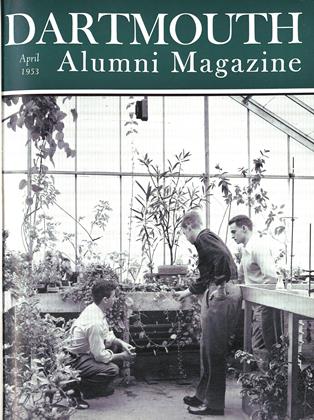HE knew the moment he opened his eyes that something was wrong but he was not quite sure what it was." This was the situation with one of Mary Poppins' youthful charges on what turned out to be "Bad Tuesday." Mary Poppins made short shift of it by taking him around the world that afternoon —an admirable palliative but for those of us who are not as mobile and whose activities involve contact with people, there are indubitably "good" days and "bad" days, and on the latter we are more than ordinarily vulnerable to the zodiacal vagaries of our moods and the humors that govern them.
This is not entirely ascribable to weather, digestion, or tax bills, although all of these are influential. On bad days things not only seem worse, they are worse. Traffic is unusually sluggish, strangers exchange half pairs of overshoes with us, undergraduates present uniformly unshaven pudding faces, and people talk to us about their jobs when we want to talk about ours. Such days are apt to be Wednesdays, when the early closing of local shops catches us with various essentials unpurchased, and the U. S. mails allow just time for the arrival of searching inquiries from remote areas where portions of our clientele have been fulminating about Hanover conditions ever since their last country club dance. Our checks are returned lacking signatures, and those of others lacking funds, or vice versa. Sash cords break and buttons pop off neck-bands.
Bad days are not days on which mistakes are made, but those on which they are discovered. The day, for example, on which it developed that although we had successfully alerted both teams and the audience to a fivehour advance in the scheduled opening of a crucial League basketball game, we had neglected to accelerate the officials, who were still enjoying the placid hospitality of our rail service while gladiators, vestal virgins, and the populace caviled in the arena.
At such times we have a fine scorn for fellow travellers in railway coaches and ideologies. We disdain the human race and most plants and animals as well, and we feel like Poco Curantes, who was esteemed great because nothing could please him. This frame of mind was epitomized, some forty years ago, by Ruby McFalls '16, who indited in the Journal kept by those temporarily immured in the "Pest House" the following evidence of divine dissatisfaction: "The ginks that play tennis by New Hampshire Hall All think they're McLaughlins. They aintl They're as awkward as camels, and can't hit a ball. Even me with my mumps could clean up on 'em all, And come back in a coffin, a saint."
Fortunately for us, and for the potential murderees we encounter on the way to work, there are more than enough good days to compensate. In earlier years, we were noted as an almost intolerable roommate or travelling companion because of our incorrigible cheeriness during the hours of dawn. And even now, as time continues its deadly work, we frequently face morn- ings which, if not actually hailed as great days to achieve, at least carry promise of reasonable contentment. And we feel ourself a sterling lad as we merrily slog through a sleet storm with a gay greeting for all and sundry. On such occasions undergraduates ap- pear eager and as though they might become loyal and influential alumni. Money continues to draw interest right through the intervals of silence that mark the obsequies of famous finan- ciers. We wish well to all, and assume reciprocity. We are a regular Mr. Do- as-you-would-be-done-by, to say noth- ing of being a freshly laundered Water Baby. Commendatory letters arrive from friends grateful for some inad- vertent kindness. Laundries sew buttons on shirts and radio commercials sound alluring. The lady we observe on the parlor car appears no longer a bedizened harridan but undoubtedly a former riot on the boards, known as Gladstone's Pet. And the influx of arrivals at Hartford is seemingly composed not of insurance agents but of up-and-coming youngsters, all members of the After Shave Club.
In fine, friendly and charitable thinking about our fellow men proves a most delightful form of selfish indulgence, and we commend it to ourself whenever we think of it possibly three or four times a month. Let those who will praise the good old days. We are all for the good new days when we can get them.
 View Full Issue
View Full Issue
More From This Issue
-
 Article
ArticleCatalysts for Democracy
April 1953 By RALPH A. BURNS '34h, -
 Class Notes
Class Notes1918
April 1953 By ERNEST H. EARLEY, RICHARD A. HOLTON -
 Article
Article1953 Alumni Fund Opens Campaign for $600,000
April 1953 -
 Class Notes
Class Notes1917
April 1953 By KARL W. KOENIGER, HOWARD A. STOCKWELL -
 Class Notes
Class Notes1929
April 1953 By F. WILLIAM ANDRES, GEORGE B. REDDING -
 Article
ArticleTHE COLLEGE
April 1953
BILL McCARTER '19
-
 Article
ArticleThe Hanover Scene
October 1952 By Bill Mccarter '19 -
 Article
ArticleThe Hanover Scene
October 1953 By BILL McCARTER '19 -
 Article
ArticleThe Hanover Scene
October 1954 By BILL McCARTER '19 -
 Article
ArticleThe Hanover Scene
November 1954 By BILL McCARTER '19 -
 Article
ArticleThe Hanover Scene
December 1956 By BILL McCARTER '19 -
 Article
ArticleThe Hanover Scene
April 1957 By BILL McCARTER '19







